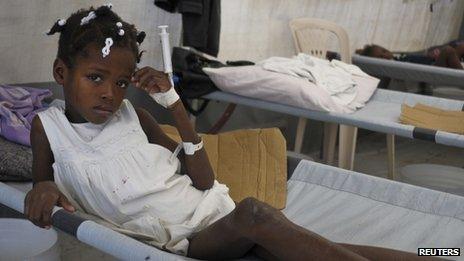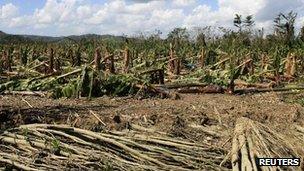Sandy: Haiti appeals for international help after storm
- Published

Haiti was already suffering the world's biggest cholera outbreak
The Haitian government has renewed calls for international emergency aid to help the country deal with the aftermath of Hurricane Sandy.
There are fears of food shortages after the hurricane, which hit on 24 October, damaged many crops in southern Haiti.
Aid workers and officials are also on alert for an increase in cholera cases in the wake of widespread flooding.
More than 50 people were killed in Haiti, which is still struggling to recover from the 2010 earthquake.
Thousands of people are still living in makeshift shelters more than two years on from the devastating quake.
The office of Prime Minister Laurent Lamothe made the renewed appeal for help on Sunday.
There is concern that unsanitary conditions could led to an increase in cholera cases.
More than 7,500 people have died in the cholera epidemic in Haiti since late 2010. Hundreds of new cases are still being registered every week.
Cuba clean-up
Although Hurricane Sandy just clipped Haiti on its way northwards, its heavy rains and strong winds destroyed more than 70% of crops in the south of the country.

Jamaica also saw damage to agriculture and infrastructure
Food insecurity, particularly in this part of Haiti, was already a major concern.
In Cuba, where 11 people died and there was extensive damage to crops, a huge clean-up is continuing. Hundreds of electricians are working to restore power in the east of the country.
Cuban President Raul Castro, who has been visiting the region, has described the country's second city, Santiago, as looking like a bomb site.
Aid has arrived form Russia, Venezuela and Bolivia, with more due from Ecuador.